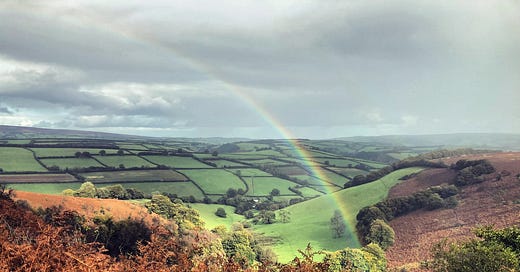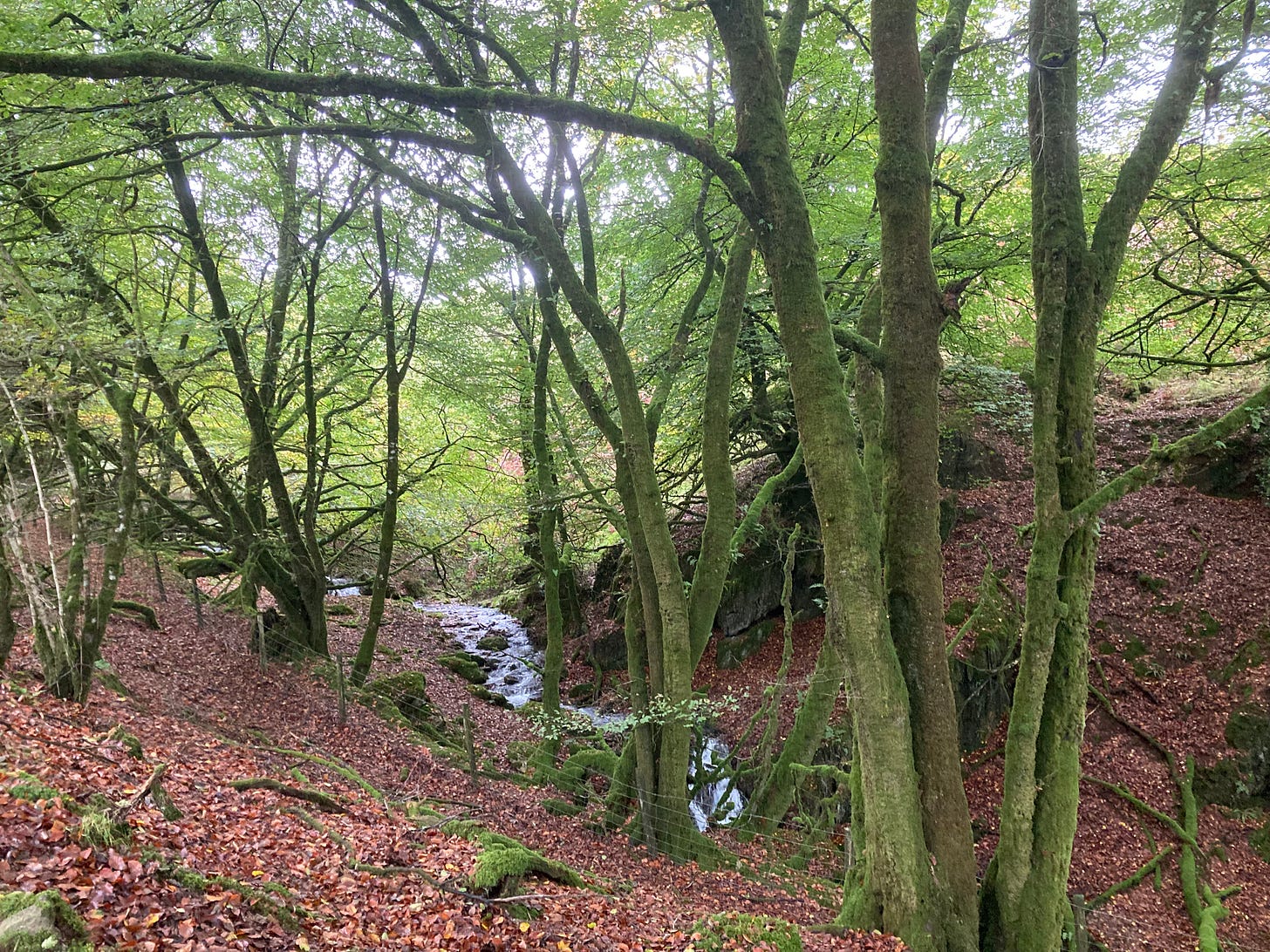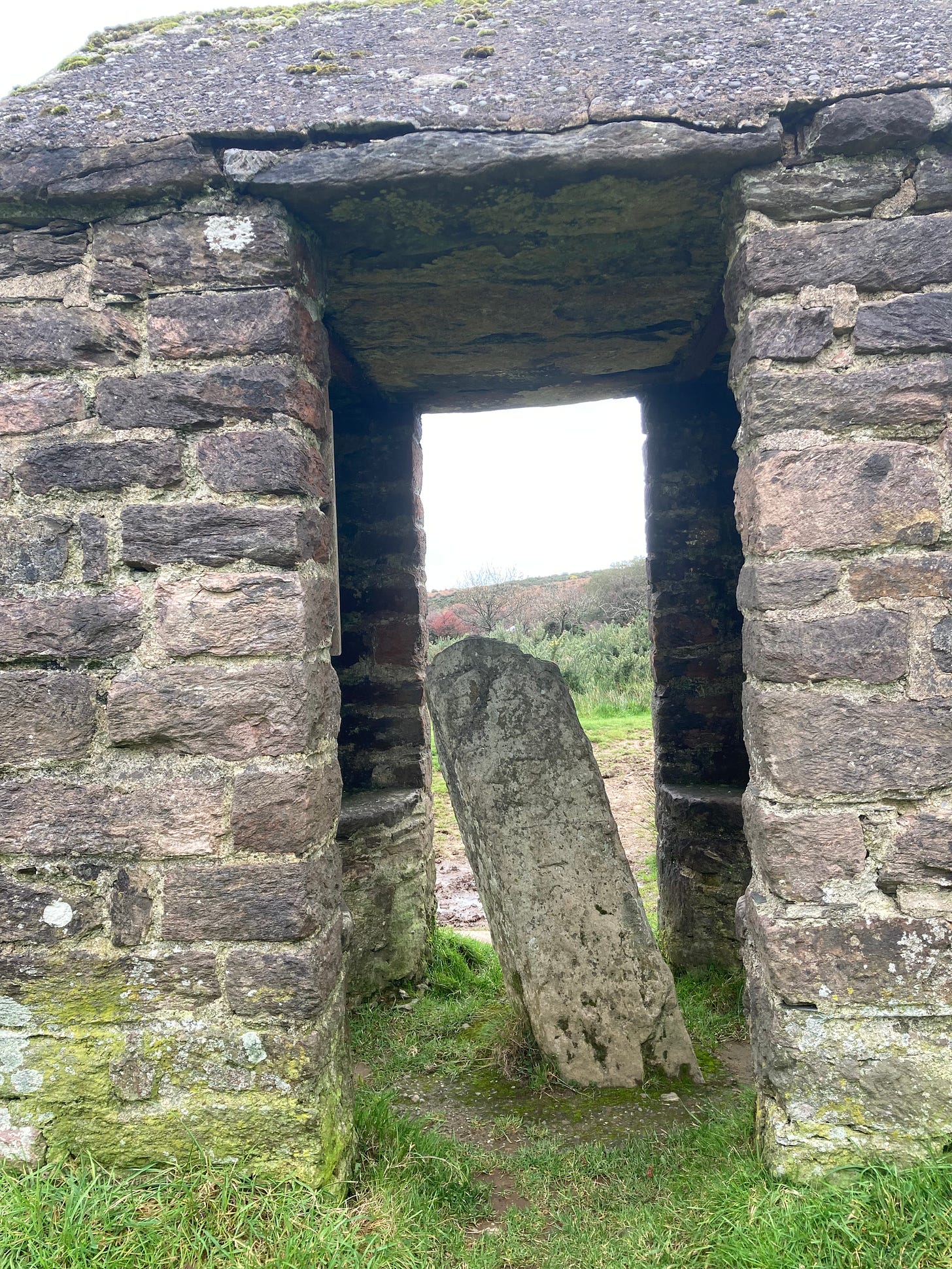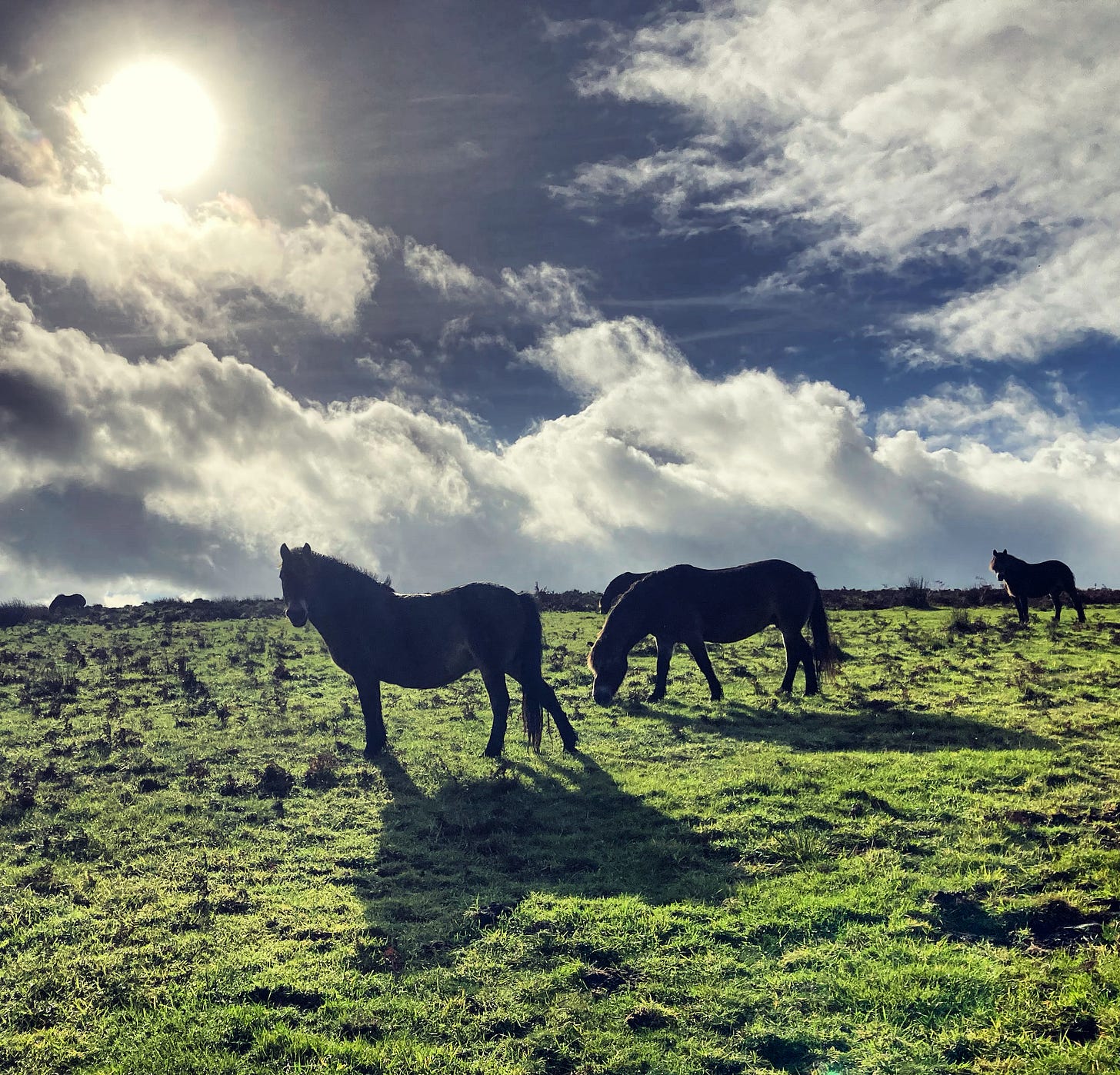I’ve been struggling with the factuality of roadkill a lot recently - feeling more upset and troubled by the sight of it than ever - so maybe going for a walk last weekend on Exmoor, the most straight-talking of Devon’s two moors, wasn’t the wisest brainwave I’ve ever had. If Dartmoor is ghosts, Exmoor is death. Much as I am calmed by its deep quiet coombes and loquacious rivers, when I come away from a walk there without being shot or run over it always feels like a bit of a result. Never before, even at this ruinous time of the year for pheasants, have I seen anything quite like what I saw on Sunday afternoon on the road going south from Winsford towards Dulverton: a four mile, almost unbroken stretch of bloodshed, of cartilage and wing and beak welded to tarmac. You will find a kind of nature lover who will frame such a sight within statistical, ecological terms - “pheasants aren’t part of the natural ecosystem, there are too many of them anyway, hogging the food that endangered native birds need to survive the winter” - but that nature lover is not me. What I am thinking about, when I witness something like this, is not statistics or the pragmatic side of rewilding; what I am thinking about is the cruel fuckwit traditions of wealthy landowners, the tossing out of small lives with the trash. What I am thinking about is what it might feel like to be a pheasant who has wobbled out into a road and been mown down but not quite fully killed by some apprentice Clarkson on his way home from the pub. What I am thinking about is the time I saw a male pheasant on a country lane nudging the head of a dead female, as if trying to wake her up. How long ago did I witness that? A decade? Longer? With every one of the years since, my brain has become more colanderlike, yet somehow the image hasn’t left me, because that’s just what I’m like, except now, the evidence would suggest, I’m even more like it than ever.
It’s been heartbreaking walking and driving the lanes near where I live lately: rabbits, squirrels, badgers, hares, foxes. I scrabble for the context that will make me mourn each one of them less - “well, at least it’s a good meal for the crows”, “put it in the framework of animal death as a whole in the UK, or even the world today, then think about it again”, “it’s part of natural selection, in a way, if you decided that we - and the machines we’ve created - are part of nature too” - but fail. Nobody warned me about this. Aren’t you supposed to develop a tougher shell with age? It appears the distillation of parts of my personality occurring in my middle years includes a distillation of that brittle part of me that makes people who are more impermeable to the pain of their fellow living creatures call me a “wuss”. Every lost cat poster tacked to a lamppost, every laminated sign a farmer has pinned to a gate featuring a sheep mutilated by a dog… it all hits harder and harder. A couple of days before my walk on Exmoor I had watched, for the first time in a decade, with some friends, the clever and funny Ben Wheatley film Sightseers, in which the caravan holiday of a 30something couple turns into a killing spree: a film which I remembered from my original viewing as cartoonishly, tolerably violent but whose crueller scenes led me to conclude after this second one, “Okay, that was a bit much: I’m never putting myself through that again.” A couple of days later, I removed - for the first time, since being here - a piece I’d posted on my Substack page. Technically speaking it was a barely modified version of something I’d written more than three years ago, the final part of a lightweight bit of episodic fiction on my website called Small Aspects Of The Lives Of Dogs, which, as well as being very silly, was also a little bit of a comment on the way many people view their own dogs as fundamentally harmless, often solely for the reason that they’re theirs, and the underreported ovine death that results from that attitude. My main reason for taking it down was that, upon full reappraisal, I thought it inferior to virtually to everything else I’ve published in the last half decade, but a few minutes after I removed it, I spotted a comment on Instagram from someone who’d read it and wanted to ask whether I was making light of people worrying about sheep, which made me feel even more glad that I’d taken it down. I believe the vast majority of people who read the piece would realise I was doing, if anything, the exact opposite of making light of worrying about sheep but, as someone who spends roughly a third of the average day worrying about sheep, even the idea of one person thinking that I’m making light of worrying about sheep bothers me.
Exmoor was in a strutting, cocksure mood when I walked on it, freshly attired in its autumn dreamcoat, which was just thin enough for me to see it flexing all its muscles through the fabric. I enjoyed the feel of its rain in my hair, the modular shelving of its tree fungus, the way the gabble of its brooks shut out some of the noise in my head and the way that, as the walk went on, and I progressed across the summit of Winsford Hill in several types of weather, Exmoor began to feel like a carwash and I began to feel like a hatchback - let’s say a 1975 Austin Maxi, a little rusty around the wheel arches - fortunate enough to experience the full range of its brushes and waxes and jets for free.
But what precisely was that noise in my head? Partly it was the noise of the grieving families of the foxes and pheasants and badgers and rabbits I’d seen splattered across roads on the way here. Partly it was the noise of my twinging whiplash, an injury sustained in a rescue operation where I hauled a pregnant ewe off a cliff just two weeks after being in a car crash on another moor, which, as painful and annoying as it is, I no longer consider a big deal since it's so ever-present that it might as well be tinnitus of the neck. And partly it was the noise of an inner voice beating myself up for posting an inferior piece of writing on the internet. “Get your act together, quicksharp: you need to write something properly good,” the voice told me. Yet, as I pointed out to the voice, what I had posted had been written in summer, 2020: it wasn’t representative of me now. “I don’t care, you made a mistake in posting it, and you need to write something less flimsy to compensate,” said the voice. “You also need to walk, a lot!” “For fuck’s sake,” I replied. “Give me a chance! Can’t you see I’m trying? I can’t do it all at the same time.” “But that’s the point,” said the voice. “Doing it all at the same time is precisely what you need to try as hard as possible to do.”
This, I’ve come to realise, is the way it goes with me. I write a book, get addicted to being inside the book’s universe, but also look forward to finishing the book and the breather that I’ll get afterwards as a reward. “Maybe I’ll finally learn the guitar properly or take those kayaking lessons or get more creative with my cooking,” I say to myself. But then I get the breather and instantly begin to miss the book painfully - even more painfully, since becoming a writer of novels - and, because the book isn’t going to be available for anybody to read for several months, con myself into believing I’ve not written it at all, get annoyed with my lack of productivity and realise I’ll not be feeling quite right until I’m properly inside the creative process again. Years ago, I used to work for a few newspaper editors whose stern manner often implied that if I missed a deadline or wrote something that displeased them, they possessed the power to end it all, just like that. Now, instead, I have the voice in my head that tells me that if I don’t write something better than what I wrote before, soon, everything will be over, and the people who are watching everything I do - whoever they are - will be around to take away my possessions and, quite possibly, my right to continue to exist as a human being.
Do not make the error of thinking that voice does not have its uses. The voice might sound harsh, for example, when it says to me “A-B-W: Always. Be. Writing. ALWAYS BE WRITING,” in the obnoxious hectoring tone of Alec Baldwin in Glengarry Glen Ross but I know it’s got my best interests at heart. If a writer tells you they are without self-doubt, you probably either need to disbelieve them or be concerned for what that means for their writing. It’s entirely possible to be confident and assured about what you’re doing and experience self-doubt at the same time. Because what kind of monster remains, when every trace of self-doubt is removed? Probably the kind that’s far more harmful than any of the mythic ones who, as dusk falls, are rumoured to prowl Exmoor. The trick is not allowing the self-doubt so much chance to breathe that it stalls the operation entirely. Generally speaking, if I’m writing a book, the self-doubt is quietly inquiring, rather than flailing about and smashing the place up, and this is because I’m inside the process and I’ve always got the reassuring evidence of the absolute joy of that and all the new places it’s taking me to as a counterweight to the more destructive part of the self-doubt. But if I’m not, if I’m in the lull between books, the Danger Period begins: the self-doubt turns into a louder, more negative beast. That’s when walking comes in, again and again, for me, in its superhero cloak. Walking calmly puts the beast in a chokehold, commands it to chill the fuck out, makes double sure it’s not going to smash any place up, least of all the south eastern part of Exmoor.
Do you feel the bizarre, seeping and contradictory pressure, in our mental health-obsessed culture, to fit a simple model of happy or sad? I know that, despite my best defences, I do. Sometimes I see the Happy Writers online: the ones constantly going from signing to signing and award ceremony to award ceremony, grinning from ear to ear, yet somehow also finding the time and inspiration to write all those books containing all those unique and varied human emotions. Have you, too, seen the Happy Writers? Have you been duped into believing they exist outside of your phone? I’m sure we all have, at times. Maybe I’ve even been something a bit like one on occasions. “It’s so great that you’re in such a good place and so happy,” a stranger once commented underneath a photo of me on a walk on another moor, in which I happened to be smiling, at the end of what had been probably the most comprehensively shite week I’d had that year. When I was thinking about writing this piece I mentally pre-penned some replies on Instagram - the only social media I still use, partly because I got tired of mentally pre-penning replies to things I post on social media - from people who view pieces of first person writing as simple reports on whether the author is currently fitting the happy or sad model, whether they are in “a good place” or “a bad place” at that time, rather than, say, pieces of prose that attempt to use personal experience as a filter to discuss potentially relatable topics. It’s as if, in these godless times, in our roles as unpaid minions for big tech, in the two dimensional gaze we have created for ourselves, we have also managed to found a new religion: the desperate need to find or represent, or at least to gaze at and fetishise, an oversimplified boxed form of happiness that those of us with any intelligence and life experience know doesn’t exist. Maybe I’m wrong. Maybe I’m incorrect in my assumption that most people are like me in the sense that they will always be a fluctuating, complex mixture of countless tiny fragments of happy and sad, for their whole life. Maybe it’s out there. Maybe the self-doubt evaporates completely when you find it. If so, I’m not sure I want it, especially as a writer. Because, when I get it, what comes next?
There’s an excellent piece by Anthony Lane in the latest issue of the New Yorker about the new kind of self-help book that instructs people to treat their own happiness as a business of which they are CEO, and their “walks, prayer time and gym sessions as if they were meetings with the president” (“Which President?” asks Lane, pertinently.) Towards the conclusion, Lane poses the vital, not often enough asked question of whether cheerfulness is, or ever has been, a measurable quality, particularly by the supposed owner of that cheerfulness. Right now, I feel - to briefly summarise - sad about a snail I accidentally trod on in 2017, happy that one of my cats has learned a crap new meow, sad because moving house yet again has made me feel like a suitcase full of money fell through a hole in my car’s floor while I wasn’t looking, happy because I bought a pretty cushion the other week for less than most pretty cushions of equivalent size generally cost these days, sad because of all the friends I have lost touch with due to being a driven nomadic workaholic with a job that at the present time still doesn’t technically function unless you’re a driven nomadic workaholic, happy because - much as she does every day - my girlfriend just arrived in the room and told me a fascinating fact from Wikipedia then used some creative wordplay that made me laugh, sad because I keep thinking about plastic waste in the sea, happy because there is a bath in the house that is less comically tiny than the bath at our last house. I don’t know what the aggregate of that amounts to and I’m not convinced it would be to my own benefit to find out. I do know that when I walk in the countryside, it - plus the other bigger issues that I am simultaneously happy and sad about - all seems more manageable. I also know that when I do, I am almost guaranteed to see dead animals. I’ve been enjoying getting settled in my new house and that’s prompted me to walk a bit less than I usually do. When I lived in houses I didn’t feel settled in, a byproduct of that feeling was that I was always buzzing off all over the place for walks and the research and experience and brainwork that came out of that was of huge benefit to my writing and mental health. To quote a great and wise song from 1972 by the Detroit band The Politicians: everything good is bad, everything bad is good.
After I’d finished my walk on Exmoor, after I’d strived to read the Latin inscription on a 6th Century standing stone on Winsford Hill and admired the blotched lichen on a church path and watched a rainbow and imagined a moorland piskie off his face at the end of it with his mouth wide open sucking down all its colours and thought about the story I would write about the same hedonistic piskie, and said hello to several sheep and inquired about their health and got rained on again and left and driven along the upsetting pheasant road again, I went to a cinema to watch a film. This is something I’ve started to do more regularly, after a long break, and I’m still getting used to the heavy manipulative bullshit of the adverts, the noise and nausea of them: the way it’s been dialled up since the last time I was regularly going to the cinema. There was one where a man drove serenely up a rural road, surrounded entirely by a vast unspoilt landscape, totally in command of his car. I don’t know what kind of car it was, but it was definitely one of the ones they make these days that look like a car. “He’s just like me,” I thought. “If you ignore the fact that he’s not braking every couple of hundred yards for pheasants and beeping his horn repeatedly in a futile attempt to train them to think roads are bad, doesn’t have a backseat overflowing with stuff he keeps meaning to take to the tip, and his expression betrays no trace of his worries about being later than he promised in recording his latest audiobook.” Every one of the adverts appeared to be built around the idea of happiness as monotone, happiness as facile permanent plateau. The other common theme was tapping into our anxieties about the state of the planet, trying to make us believe that by buying something, or funding something, we would - as well as achieving that plateau of representative boxed happiness - be contributing to the righting of wrongs, earth’s recovery, the ending of hardships.
The Latin inscription on the stone on Winsford Hill was a little too faint for me to read in the end but I cheated by looking it up on my phone. It says CARATACI NEPVS which, roughly translated, means that it was erected in memory of someone claiming to be an ancestor of Caratacus, the first century British Chieftain who, after resisting and being captured by Emperor Claudius’s soldiers, was transported to Rome and - not totally unlike the once stubborn and single-minded landscape writer who, worried about inflation and rising interest, agrees to write advertising copy for Peter Storm - lived out his days as a “free” man amongst his former enemies. An old stone is just an old stone, but it can open up all sorts of paths of thought, and, as I walked away from this one, I was reminded of another Latin phrase, solvitur ambulando, which means “it is solved by walking”. Back when I used to use Twitter, it was something that, in the mildly irritating goal-driven parlance of the medium, “did numbers” when I twinned it with quite a nice photo I’d taken on a walk eastwards towards Lulworth, in Dorset, early on New Year’s Day 2019. Though it’s hard to say for certain, I possibly sold six or seven more books as a result, earning maybe as much as £10 in royalties in the process, which made me glad that I turned down some work I was offered writing advertising copy for a corporation a few years ago and decided to do this sort of thing instead. It’s just the kind of phrase you can imagine some opportunistic wanker turning into an advertising slogan. I can see it now: the group of attractive people, all under the age of 32, planting trees early one morning in an idyllic landscape scrubbed clean of roadkill, grain silos and recently disembowelled rabbits, then coming over the ridge, laughing at something phenomenally witty one of them has said, or perhaps just the sheer joy of being alive in this unsullied place. Next, you see the Latin phrase, then, finally, a picture of a pair of high end hiking boots and their brand name, combined with the instruction “Stomp on your anxiety.” The camera conveniently stops rolling just before the spaniel appears with the dead pheasant in its mouth being chased approvingly by some bloodthirsty bastard in a Barbour jacket.
“Solved” is a word open to considerable interpretation but it’s probably best to keep the definition loose. Do I “solve” the anxiety I feel about climate change, about the increasing role of AI in our lives, about unanswered texts and emails, about unreturned house deposits, about unwritten books, by walking? I don’t. I also don’t treat my walks as a meeting with a president (nobody wants an argument on a walk). But, reliably, every time I go on a long ramble and open myself up to the elements, a mysterious alleviating magic floods in then repurposes itself as perspective and, if I’m lucky, inspiration and the condition of happy, divine productivity the frenemies of Caratacus called “felicitas”. It’s not going to stop me being a big old mix of sad and happy, it’s not going to make me buy something from a corporation and save the world in the process, it’s probably not even going to help me live my best life, but it’s going to get me over a hurdle until the next hurdle appears. In a culture that’s constantly telling us we need to be more, walking tells us we are enough, that this - this valley, this underrated sheep, this Sixth Century stone - is enough, for now, just as they were once enough for our ancestors. I also don’t think walking is going to permanently quell my urge to do more. I want to read more, travel more, reply more, help more, relax more. I suspect I’ll keep wanting that. Maybe I will do all of it, and even more, at some point. But for now I’m going to go on a few walks and write another book. I am aware it’s some distance from our new religion’s idea of a model existence but time has told me that there are significantly worse ways to live.
In case you’d like to read more of my writing about the countryside, and other things, here are some links to my recent books
1983 (to be published summer, 2024)








I too have been waiting to get a harder shell as I get older and it's not happening. The softer-shelled people have a more difficult time in this world, but it's okay, it's a sign of humanity. And being okay with being happy and sad at the same time is as well. What's the alternative? Denying parts of yourself, chasing after some social media flattened world, which your writing is so obviously and beautifully an antidote to.
A brilliant piece Tom and echoes so much of how I feel. When I see dead creatures on the road I always ask that (in my case) the Goddess takes them to her arms. I think any acknowledgment of a creatures passing is important. We are all part of this world and as such all lives have a purpose and reason to be here,